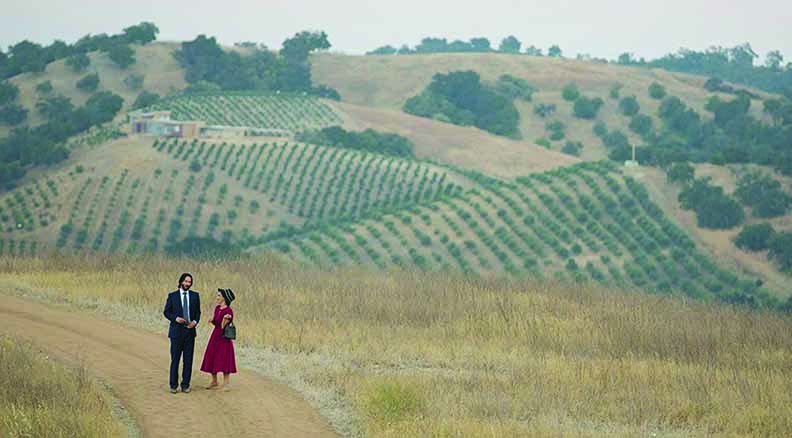SLO County scenery makes great backdrop for shooting movies

Paso Robles was the setting for this scene from the film “Destination Wedding,” starring Keanu Reeves and Winona Ryder.
“Destination Wedding” — a newly released film starring Keanu Reeves and Winona Ryder — is more about the destination than the wedding. Filmed primarily in Paso Robles and San Luis Obispo, the movie highlights the scenery that draws many to the county.
“I think (the producer) found in Paso Robles a backdrop that would fully complement the two actors,” said Danna Stroud, executive director of Travel Paso.
The majority of the filming took place over five days at the Dubost Winery and Vineyard, which is overseen by Kate Dubost, a retired math teacher.
A producer of the movie, Elizabeth Dell, was one of the first sign-ups for the Dubost’s wine club and, along with her sister, have since become like “adopted stepdaughters” to Dubost and her husband, Dubost said. When the filmmakers were scouting locations, Dell suggested the Dubost winery.
For Dubost, who was on set the entire time lending a helping hand, the filming process was a “real eye-opener.” She likened the movie-making process to the wine-making process.
“When you go to a movie, you just watch the movie and you see the magic, and it’s like the wine industry because when you drink a glass of wine you don’t see the magic behind (it),” she said.
Since the only speaking roles in the indie movie were Ryder and Reeves, a lot of friends and family of the Dubosts filled in as extras, which made the premiere party in downtown Paso Robles on Sept. 6 more fun.
“My husband was the father of the bride, my stepson was the groom,” said Dubost. “Everyone loved seeing their friends or family on TV.”
Hosted by the Dubosts, the film premiere attracted a sold-out audience of approximately 330 people filling two theaters, and the afterparty was limited to 230 people due to venue capacity.
“I saw applause for the Paso images that were selected so beautifully in the film, some ‘oohs’ and ‘ahhs’ and some tremendous applause for the Dubost winery in the film,” said Stroud.
The Apple Farm and Inn in San Luis Obispo, where the film crew also spent several days filming, hosted a premiere as well on Sept. 7. While the period was difficult due to the large number of demands on staff, the inn profited from their stay.
“They also rented a lot of hotel rooms from me, we served breakfast and lunch. They stayed mostly on-site,” said Kim Wykoff, administrative assistant to the general manager at Apple Farm.
The inn also benefited from the logo exposure in the film, and Wykoff hopes the exposure will “be like ‘Sideways’ was for the Santa Ynez Valley.”
Filming outside of Los Angeles County can prove highly lucrative for both the towns and the production companies, which typically spend around $50,000 per day in the local community for hotels, food, set design and more, according to California Film Commission Executive Director Amy Lemisch.
Filming in San Luis Obispo County, specifically, can be enticing to companies due to inexpensive and easy-to-obtain permits and the vast array of scenery in relative distance to each other, said Kylee Corliss, film commission liaison at Visit SLO Cal.
Corliss oversees the approximately 3,600 square miles of SLO County and works with production companies to find the perfect slice of land that they’re looking for. She then ensures all their permits get approved.
As more film companies come to SLO County to shoot movies, so do brides and grooms for their weddings.
Nanci Bernard, a wedding planner in Paso Robles, said the city is “on fire.” Typically, Bernard only sees weddings during June and July, which are usually peak wedding months. Now, she’s booked up throughout the year, and sees a lot more competition as well.
“There’s more planners, more florists, more everything — it’s a crazy insane business,” she said.
Doug Hauck, owner of Hammersky Vineyards, has seen a similar surge in growth. During his venue’s peak season, which typically starts around the end of March and carries through the beginning of December, Hammersky hosts a wedding a weekend without even trying.
Hauck said if he became dedicated to building up the wedding business, he would want to look into making it more convenient for guests to travel to Paso Robles.
While out-of-state guests, who are typically the ones booking weddings in the area, might love the rolling hills and temperate climate of Paso Robles, they don’t love having to fly into SFO or LAX and then driving to Paso Robles.
Even still, the wedding industry in Paso Robles has grown, largely due to the diversity of venues in the city, according to Stroud. From “venues that provide rustic and quaint country charm settings” to more sophisticated locations with “beautiful gardens,” Stroud calls the multitude of options “breathtaking.”
Her team at Travel Paso has molded their fall marketing plans around the film and plans to promote Paso Robles as a wedding destination.
“(The movie is) almost a ‘Paso story’ and really showcases the natural landscape and beauty,” she said. “People are becoming more familiar with Paso.”











